PLATED AND ELECTROPLATED SILVER MARKS OF FRANCE DOUBLÉ, PLAQUÉE, METAL, METAL BLANC, MÉTAL ARGENTÉ -P - Z- |
|
created by Giorgio B. owner of www.silvercollection.it ©  |
This is a page of A Small
Collection of Antique Silver and Objects of vertu, a 1000
pages richly illustrated website offering all you need to know
about antique silver, sterling silver, silverplate, sheffield
plate, electroplate silver, silverware, flatware, tea services
and tea complements, marks and hallmarks, silver marking system and silver
hallmarks guide, articles, books,
auction catalogs, famous silversmiths (Tiffany, Gorham, Jensen,
Elkington, WMF, Reed & Barton, Mappin & Webb, Bateman Family),
history, oddities ... |
|
|
French solid silver is characterized by series of hallmarks and the presence of the maker's mark in a lozenge/diamond-shaped cartouche. On plated metal a square or rectangular cartouche is used for maker's mark. From 1797 the mark of the "métal plaqué", equivalent to British "Old Sheffield Plate", was a square or rectangular cartouche containing: - the initials of the maker - the word "DOUBLÉ" or "PLAQUÉ" - the figure indicating the quantity of silver (optional) The thickness of silver was indicated by a number followed by a small "E", "M" or "EM", as abbreviation of Dixième (Tenth). The number represented the percentage of silver relative to the base metal (higher numbers are indicative of the poorest quality of plating) |




|
From 1860, to differentiate the "métal plaqué" from the "argenture par dépôt électrolytique", equivalent to British EPNS (Electro Plated Nickel Silver), were used square marks containing: - the initials of the maker and the figure indicating the quantity of silver |

|
- the initials of the maker, a symbol and the figure indicating the quantity of silver |


|
- the initials of the maker and a symbol accompanied by another cartouche containing the figure of the silver content |


|
Sometimes they are accompanied by additional marks with the inscription "METAL" or "METAL BLANC" (WHITE METAL) |

 |
|
|
MÉTAL ARGENTÉ |
| To strengthen consumer protection, the French Parliament voted on July 1, 1983 a law which reformed the Guarantee and codified the conditions of silver hallmarking. In this context it was decided to measure the thickness of silver deposited on the entire surface and to institute minimum standard thicknesses for silverplate. The old mark expressed in grams, which is not compulsory, remains in use. Often it indicates silver weights greater than the new imposed standards. The new square hallmark (applicable from August 1984) therefore guarantees the thickness of the silver layer deposited on the item. The POINÇON CARRÉ is the official mark for "métal argenté". It is a square containing: - I or II, identifying the first or second quality of manufacture - a symbol identifying the maker - the initials of the maker 

|
These are the requirements to be allowed to use the "POINÇON CARRÉ" mark and "métal argenté" denomination (plating thickness is measured in Micrometers: a micron is one thousandth of a millimeter or 0.001mm). 
|
|
|
NUMBERS IN FRENCH SILVERPLATE |
| The meaning of numbers in French silverplate marks has changed over time: 1797 - c. 1860 number accompanied by "E", "M" or "EM" (meaning Dixiéme / tenth) in the upper right corner. This number is the percentage of silver used to plate the copper ingot (plating was made using the system known in the UK as "Old Sheffield Plate") c. 1860 - 1983 number alone or accompanied by "G" or "GR". This is the number of grams of silver used to plate a single item or a dozen of spoons or forks (referred to the process of silver electroplating which has supplanted the OSP system) after 1983 "Roman" numbers I or II in a corner. This number identifies the first or second quality of "métal argenté". The quality of the plating is determined by the microns of silver present on the item (a micron is one thousandth of a millimetre or 0.001mm). |
|
FRENCH SILVERPLATE MARKS DIRECTORY BY INITIALS/SYMBOLS DIRECTORY BY NAMES MAKER'S MARK INITIAL: A - B - C - D - E - F - G - H - I - J - K - L - M - N - O - P - Q - R - S - T - U - V - W - X - Y - Z - |
FRENCH SILVERPLATE MAKERS' MARKS |
 P.& B.H and P.& B.L into an oval 
 Picard & Bazin-Levallois, successors to Mauger-Daniel
Picard & Bazin-Levallois, successors to Mauger-Daniel
PA and the head of an Egyptian pharaoh / la tête d'un pharaon égyptien (a similar symbol was used for solid silver/argent massif hallmark. The PA stands, possibly, for Adrien Pillon, the founder of Ercuis) 

 ST HILAIRE, a line of Orfèvrerie Ercuis after merging with Produx SA, registered by SOCIETE ERCUIS-PRODUX on 30 March 1988, 1st and 2nd quality "métal argenté". The Orfèvrerie Produx Saint Hilaire was a secondary establishment of Ercuis and closed 3 October 2006
ST HILAIRE, a line of Orfèvrerie Ercuis after merging with Produx SA, registered by SOCIETE ERCUIS-PRODUX on 30 March 1988, 1st and 2nd quality "métal argenté". The Orfèvrerie Produx Saint Hilaire was a secondary establishment of Ercuis and closed 3 October 2006

PAX LABOR  Maker not identified
Maker not identified
PB (or Sté PB) and a cross (or a dagger) / une croix (ou un poignard) 

 Pichard-Balme, Saumur, active from 1844
Pichard-Balme, Saumur, active from 1844

PB and a hammer / un marteau  Paul Boyer, 37/39 Passage st Sébastien, Paris, active from 1935
Paul Boyer, 37/39 Passage st Sébastien, Paris, active from 1935
PB and a hammer / un marteau  Bognon Pierre, 7 rue de Saint Sébastien, Paris, active 1921-1925
Bognon Pierre, 7 rue de Saint Sébastien, Paris, active 1921-1925
PD or DD interwined and a spoon / une cuillère 


 Devouge Pierre / Devouge & Dupont, 8bis rue Fontaine-au-Roi, Paris, factory at Hirson (Aisne), active from 1922
Devouge Pierre / Devouge & Dupont, 8bis rue Fontaine-au-Roi, Paris, factory at Hirson (Aisne), active from 1922

PE MA J around a star / autour d'une étoile  Maker not identified
Maker not identified
PG and a helmet / un casque  Guillaumot Paul-François, 40 galerie Montpensier, Paris, active from 1907
Guillaumot Paul-François, 40 galerie Montpensier, Paris, active from 1907
PG and a rake / un rateu  Gigon Paul, 38 rue des Gravilliers, Paris, active from 1912
Gigon Paul, 38 rue des Gravilliers, Paris, active from 1912
PHENIX  Orfèvrerie Phénix, Lyon, active first third of 20th century
Orfèvrerie Phénix, Lyon, active first third of 20th century
PM and a symbol (a ram's head?) / un symbole (une tête de bélier?) 

 Meurgey Pierre, 20 passage Saint-Sébastien, Paris, active 1929-present
Meurgey Pierre, 20 passage Saint-Sébastien, Paris, active 1929-present
PM and a windmill / un moulin 
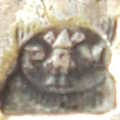 Morel Paul, 44bis Boulevard Richard-Lenois, Paris and rue Paul Bert, Saint-Ouen (factory), active from 1910 succeding to Maison N. Bourgeois
Morel Paul, 44bis Boulevard Richard-Lenois, Paris and rue Paul Bert, Saint-Ouen (factory), active from 1910 succeding to Maison N. Bourgeois
P MASSAT and a lyre with a point on each side / une lyre avec un point de chaque côté  Massat Frères, 15 rue Crussol, Paris, active 1885-1910. Succeeded to Paul Massat, 1877-1885
Massat Frères, 15 rue Crussol, Paris, active 1885-1910. Succeeded to Paul Massat, 1877-1885
PP and a lozenge / un losange 
 Comptoir Paris Province, 8 rue Charlot, Paris, active from 1933
Comptoir Paris Province, 8 rue Charlot, Paris, active from 1933
PS and a symbol / un symbole  Pernot & Semin, Paris, late 19th century
Pernot & Semin, Paris, late 19th century
PT and a bird's nest / un nid d'oiseau  Tosany Paul, 51 rue Hermel, Paris, from 1922
Tosany Paul, 51 rue Hermel, Paris, from 1922
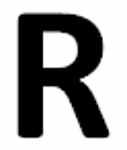 R&Cie and a clover / un trèfle 
 Ravinet & Cie, 83 rue du Temple, Paris, Succeeded in 1912 to Ravinet Louis & Denfert Charles, followed in 1923 by Ravinet d'Enfert & Cie. The company closed activity in 1984
Ravinet & Cie, 83 rue du Temple, Paris, Succeeded in 1912 to Ravinet Louis & Denfert Charles, followed in 1923 by Ravinet d'Enfert & Cie. The company closed activity in 1984
RD and a clover / un trèfle 


 Ravinet Louis & Denfert Charles, 83 rue du Temple, Paris, active 1891-1912. Succeeded by Ravinet & Cie and from 1923 by Ravinet d'Enfert & Cie. The company closed activity in 1984
Ravinet Louis & Denfert Charles, 83 rue du Temple, Paris, active 1891-1912. Succeeded by Ravinet & Cie and from 1923 by Ravinet d'Enfert & Cie. The company closed activity in 1984
RK and a winged elephant / un éléphant ailé 
 RENEKA, founded in 1927 by René Kauss, 3 Route des Romains, Strasbourg (Bas-Rhine)
RENEKA, founded in 1927 by René Kauss, 3 Route des Romains, Strasbourg (Bas-Rhine)
RM and a star / une étoile 


 Roux - Marquiand, Lyon, from 1876
Roux - Marquiand, Lyon, from 1876
RM and a lamp / une lampe électrique 
 Marson Robert, 30 rue de Bondy, Paris, active from 1918
Marson Robert, 30 rue de Bondy, Paris, active from 1918
RR and a cross / une croix  Reysec Rodolphe, 187 rue du Temple, Paris, active c. 1922-1946. Related to Reysec & Varenne, active at the same address
Reysec Rodolphe, 187 rue du Temple, Paris, active c. 1922-1946. Related to Reysec & Varenne, active at the same address
RVP inside three shields into a circle / à l'intérieur de trois boucliers dans d'un cercle  Reysec & Varenne, 187 rue du Temple, Paris, active c. 1922-1946. Related to Reysec Rodolphe, active at the same address
Reysec & Varenne, 187 rue du Temple, Paris, active c. 1922-1946. Related to Reysec Rodolphe, active at the same address
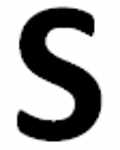 SA and a halberd / une hallebarde 

 Société Anonyme Argental, 72, boulevard Beaumarchais, Paris, active at "Usine de l'Argental" Coulommiers en Seine-et-Marne from 1921. The activity was bought in 1968 by Orfèvrerie Ercuis
Société Anonyme Argental, 72, boulevard Beaumarchais, Paris, active at "Usine de l'Argental" Coulommiers en Seine-et-Marne from 1921. The activity was bought in 1968 by Orfèvrerie Ercuis
SF and four stars / quatre étoiles SF above R / au-dessus de R 
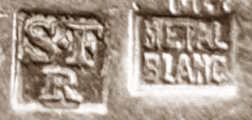 Saglier Frères, 12 rue d'Enghien, Paris, Eugène and André Saglier, succeeded to their father Victor Saglier, active from 1897
Saglier Frères, 12 rue d'Enghien, Paris, Eugène and André Saglier, succeeded to their father Victor Saglier, active from 1897often accompanied by the mark VS of their father Victor Saglier 
S.F.A.M. and a handshake / une poignée de main ("poinçon de bonne foi" / good faith mark) 



 S.F.A.M., Société Française d'Alliage de Métaux, created in 1926 in Bornel, Oise region. Renamed Orfèvrerie de Chambly in 1983. Closed in 2004
S.F.A.M., Société Française d'Alliage de Métaux, created in 1926 in Bornel, Oise region. Renamed Orfèvrerie de Chambly in 1983. Closed in 2004

The Orfèvrerie de Chambly maintained the figural trademark with the initials CM SFOA a bee / une abeille or a stylized teapot / une théière stylisée 


 Société Francaise d'Orfèvrerie d'Art, 7 rue Crillon, Paris, active c. 1920. Often accompanied by ARGIT
Société Francaise d'Orfèvrerie d'Art, 7 rue Crillon, Paris, active c. 1920. Often accompanied by ARGIT
SM and a palm / une palme 

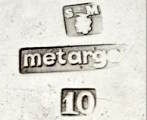 Mestrallet Sylvain, active from 1906
Mestrallet Sylvain, active from 1906
SM and crest with bishop's crozier / écusson à crosse épiscopale 

 Orfévrerie St. Médard, Founded in 1898. Became the French branch of Belgian firm Eternum (founded 1924).
Saint Médard Eternum, 27 Rue Jules Raimu, Chambly, Picardie, France. Succeeded in 1982 by Société Saint-Médard SA.
Orfévrerie St. Médard, Founded in 1898. Became the French branch of Belgian firm Eternum (founded 1924).
Saint Médard Eternum, 27 Rue Jules Raimu, Chambly, Picardie, France. Succeeded in 1982 by Société Saint-Médard SA.
SMF and fleur de lys  Maker not identified
Maker not identified
SO over G and a crown / une couronne  Maker not identified
Maker not identified
SNO around a crown / autour d'une couronne 
 Orfèvrerie Rex, 14 rues Crespin, Paris, active c. 1900
Orfèvrerie Rex, 14 rues Crespin, Paris, active c. 1900
SOH 

 Societé d'Orfèvrerie Hotelière, SOH, Paris
Societé d'Orfèvrerie Hotelière, SOH, Paris
SP and a caduceus / un caducée 
 Prud'homme Stéphane, rue Amelot, Paris. Succeeded in 1928 to Prud'homme Ernest
Prud'homme Stéphane, rue Amelot, Paris. Succeeded in 1928 to Prud'homme Ernest Sté S and a cross into a shield / une croix de Japon  Sté Savoie, 7 rue de la Fontaine au Roi, Paris. Active from 1952
Sté Savoie, 7 rue de la Fontaine au Roi, Paris. Active from 1952 TA and a lion / un lion  Asésio Th., Orfèvrerie du Lion, Paris, active c. 1900
Asésio Th., Orfèvrerie du Lion, Paris, active c. 1900
TA ET FILS and a standing lion holding an oval / un lion debout tenant un ovale 
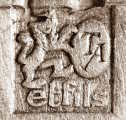 Asesio Thomas et Fils 21 rue Compans, Paris, active from 1934
Asesio Thomas et Fils 21 rue Compans, Paris, active from 1934
TD intertwined / imbriqués  Thèze, Deance & Cie (Crysor), 43-45 rue des solitaires, Paris, active c. 1900
Thèze, Deance & Cie (Crysor), 43-45 rue des solitaires, Paris, active c. 1900
T.Fres and a terra cotta casserole dish / une huguenote  Tétard Frères, 4 rue Béranger, Paris, active from c.1903
Tétard Frères, 4 rue Béranger, Paris, active from c.1903
TH a shamrock / un trèfle 
 Henry Théodore, 46 rue de la Folie-Méricourt, Paris, active 1870s/1880s
Henry Théodore, 46 rue de la Folie-Méricourt, Paris, active 1870s/1880s
TL and a ewer from Dinant / une aiguière de Dinant 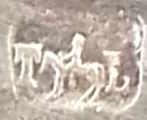 Tête & Leroy, 81 rue Saint-Maur, Paris, active from 1924
Tête & Leroy, 81 rue Saint-Maur, Paris, active from 1924
 UDNER  Udner, Lyon
Udner, Lyon
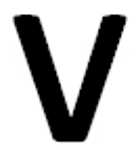 VDM and two crossed cutlery and a star / deux couverts croisés et une étoile 
 Maker not identified
Maker not identified
VER DEL into a square / dans un carré  Vernot, Délean & Cie, 59 rue des Gravilliers, Paris, active c. 1900
Vernot, Délean & Cie, 59 rue des Gravilliers, Paris, active c. 1900
VEYRAT and two stars / deux étoiles 

 Veyrat Jean-François, Paris, active from 1815-1820 (fer plaqué / plated iron), 1820-1832 (cuivre plaqué / plated copper) and 1832-1840 (argent et métal plaqué). Succeeded by Veyrat et fils (1840-1849, in partnership with his son Adolphe Veyrat)
Veyrat Jean-François, Paris, active from 1815-1820 (fer plaqué / plated iron), 1820-1832 (cuivre plaqué / plated copper) and 1832-1840 (argent et métal plaqué). Succeeded by Veyrat et fils (1840-1849, in partnership with his son Adolphe Veyrat)
VH and a seated lion / un lion assis 



 Coutellerie de table Apollonox - Société Générale de Coutellerie et Orfèvrerie, factory located in Thier (Auvergne) with headquarters in rue Pastourelle, Paris and 26 rue Paul Bert, Saint-Ouen
Coutellerie de table Apollonox - Société Générale de Coutellerie et Orfèvrerie, factory located in Thier (Auvergne) with headquarters in rue Pastourelle, Paris and 26 rue Paul Bert, Saint-Ouen
VL and a sailing ship / un voilier  Maker not identified
Maker not identified
VveD and a woman's head with helmet / une tête de femme avec un casque 
 Delaire V.ve, 94 boulevard Richard-Lenoir, Paris, active 1920/1928
Delaire V.ve, 94 boulevard Richard-Lenoir, Paris, active 1920/1928
WISKEMANN 

 Wiskemann, Bruxelles, Belgium. Founded in 1872 by Otto-Léonard Wiskemann
Wiskemann, Bruxelles, Belgium. Founded in 1872 by Otto-Léonard Wiskemann
FIGURAL MARKS THREE-MASTED BOAT / BATEAU A TROIS MÂTS  Rouyer, 8 rue de Bretagne, Paris, active c. 1900. Succeeded by V. Langrand (c.1921)
Rouyer, 8 rue de Bretagne, Paris, active c. 1900. Succeeded by V. Langrand (c.1921)
|
|
FRENCH SILVERPLATE MARKS DIRECTORY BY INITIALS/SYMBOLS DIRECTORY BY NAMES MAKER'S MARK INITIAL: A - B - C - D - E - F - G - H - I - J - K - L - M - N - O - P - Q - R - S - T - U - V - W - X - Y - Z - |
REPERTOIRE DES ORFEVRES FRANCAIS AA AH B CA CG D EA EJ F GA GH HA HG I JA JH K LA LH MA MH N O PA PH Q R S T U V W X Y Z |
|
This is a page of A Small Collection of Antique Silver and Objects of vertu, a 1500 pages richly illustrated website offering all you need to know about antique silver, sterling silver, silverplate, sheffield plate, electroplate silver, silverware, flatware, tea services and tea complements, marks and hallmarks, articles, books, auction catalogs, famous silversmiths (Tiffany, Gorham, Jensen, Elkington, WMF, Reed & Barton, Mappin & Webb, Bateman Family), history, oddities ... SITE MAP SILVER DICTIONARY |